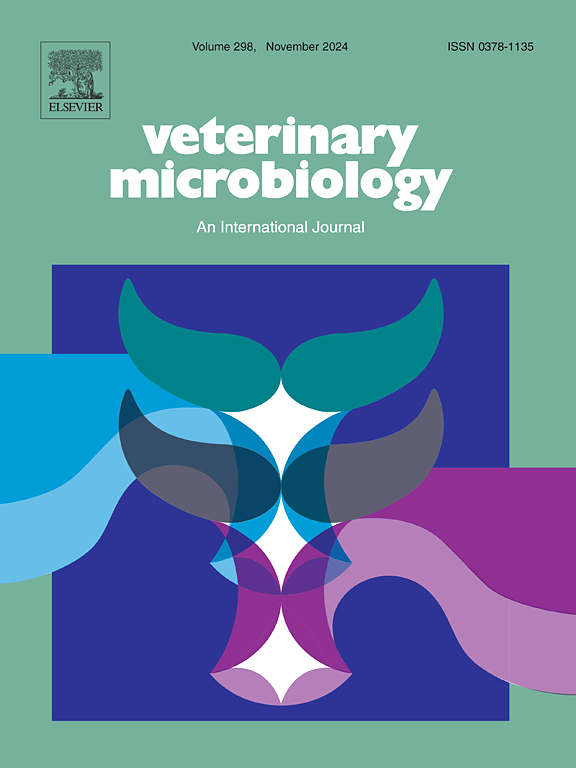Zn2+通过Akt-mTOR途径诱导自噬抑制PEDV复制。
IF 2.4
2区 农林科学
Q3 MICROBIOLOGY
引用次数: 0
摘要
猪流行性腹泻病毒(PEDV)是一种引起猪腹泻的冠状病毒,给全球养猪业造成了严重的经济损失。目前,临床上对猪流行性腹泻(PED)的有效抗病毒治疗方法很少。锌(Zn2+)是一种必需的矿物质,已知可以通过调节免疫系统活性来减少仔猪从牛奶过渡到固体饲料时的腹泻。本研究探讨Zn2+在PEDV感染调控中的作用,探讨其减少腹泻的潜力。我们的研究结果表明,Zn2+通过诱导自噬来抑制PEDV在Vero-E6细胞中的复制。值得注意的是,我们通过使用自噬抑制剂(3-MA)和激活剂(RAPA)证实了自噬对PEDV感染的负调控。进一步分析发现,PEDV感染激活了Akt-mTOR信号通路,而Zn2+在Vero-E6细胞中抑制了该通路。此外,在Vero-E6细胞中,Akt和AktSer473质粒的过表达突出了Akt磷酸化在Zn2+诱导的自噬中抑制PEDV复制的作用。综上所述,本研究确定了Zn2+通过Akt-mTOR途径介导自噬抑制PEDV感染的机制。这些发现为Zn2+作为体内有效抗病毒药物的潜在用途提供了有价值的见解。本文章由计算机程序翻译,如有差异,请以英文原文为准。
Zn2+ inhibits PEDV replication by inducing autophagy through the Akt-mTOR pathway
Porcine epidemic diarrhea virus (PEDV) is a coronavirus that induces diarrhea in pigs, leading to severe economic losses in the global pig industry. Currently, effective antiviral treatments for porcine epidemic diarrhea (PED) are rarely available for clinical use. Zinc (Zn2+), an essential mineral, is known to reduce diarrhea in piglets transitioning from milk to solid feed by modulating immune system activity. In this study, the role of Zn2+ in regulating PEDV infection was investigated to explore its potential for reducing diarrhea. Our findings show that Zn2+ inhibits PEDV replication in Vero-E6 cells by inducing autophagy. Notably, we demonstrated that autophagy negatively regulates PEDV infection, as confirmed by the use of autophagy inhibitor (3-MA) and activator (RAPA). Further analysis revealed that PEDV infection activates the Akt-mTOR signaling pathway, while Zn2+ inhibits this pathway in Vero-E6 cells. Additionally, overexpression of Akt and AktSer473 plasmids in Vero-E6 cells highlights the role of Akt phosphorylation in the Zn2+ induced autophagy that inhibits PEDV replication. In summary, this study identifies a mechanism by which Zn2+ suppresses PEDV infection through the Akt-mTOR pathway by mediating autophagy. These findings provide valuable insights into the potential use of Zn2+ as an effective antiviral agent in vivo.
求助全文
通过发布文献求助,成功后即可免费获取论文全文。
去求助
来源期刊

Veterinary microbiology
农林科学-兽医学
CiteScore
5.90
自引率
6.10%
发文量
221
审稿时长
52 days
期刊介绍:
Veterinary Microbiology is concerned with microbial (bacterial, fungal, viral) diseases of domesticated vertebrate animals (livestock, companion animals, fur-bearing animals, game, poultry, fish) that supply food, other useful products or companionship. In addition, Microbial diseases of wild animals living in captivity, or as members of the feral fauna will also be considered if the infections are of interest because of their interrelation with humans (zoonoses) and/or domestic animals. Studies of antimicrobial resistance are also included, provided that the results represent a substantial advance in knowledge. Authors are strongly encouraged to read - prior to submission - the Editorials (''Scope or cope'' and ''Scope or cope II'') published previously in the journal. The Editors reserve the right to suggest submission to another journal for those papers which they feel would be more appropriate for consideration by that journal.
Original research papers of high quality and novelty on aspects of control, host response, molecular biology, pathogenesis, prevention, and treatment of microbial diseases of animals are published. Papers dealing primarily with immunology, epidemiology, molecular biology and antiviral or microbial agents will only be considered if they demonstrate a clear impact on a disease. Papers focusing solely on diagnostic techniques (such as another PCR protocol or ELISA) will not be published - focus should be on a microorganism and not on a particular technique. Papers only reporting microbial sequences, transcriptomics data, or proteomics data will not be considered unless the results represent a substantial advance in knowledge.
Drug trial papers will be considered if they have general application or significance. Papers on the identification of microorganisms will also be considered, but detailed taxonomic studies do not fall within the scope of the journal. Case reports will not be published, unless they have general application or contain novel aspects. Papers of geographically limited interest, which repeat what had been established elsewhere will not be considered. The readership of the journal is global.
 求助内容:
求助内容: 应助结果提醒方式:
应助结果提醒方式:


